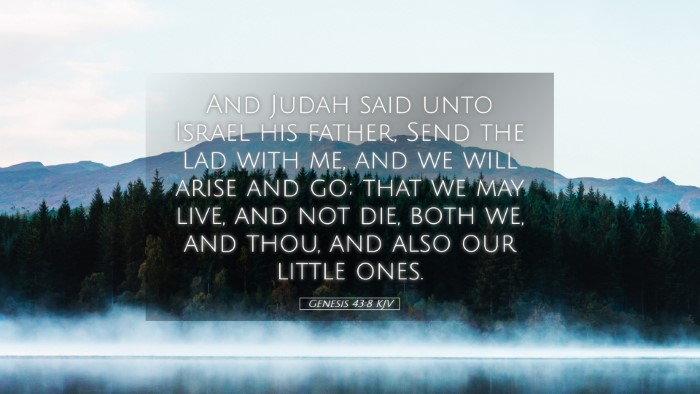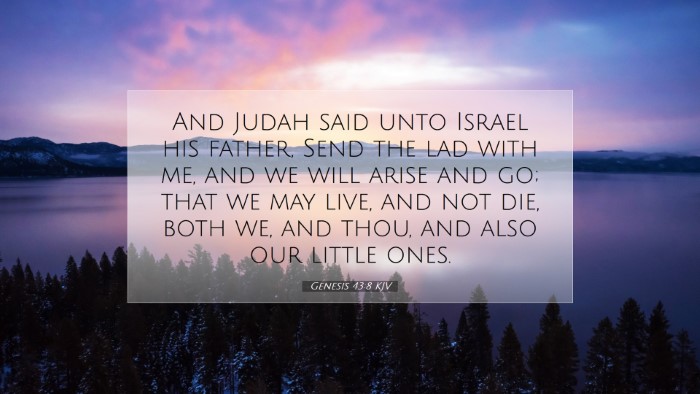Commentary on Genesis 43:8
Verse: Genesis 43:8 - "And Judah said unto Israel his father, Send the lad with me, and we will arise and go; that we may live, and not die, both we, and thou, and also our little ones."
Introduction
This verse encapsulates a critical moment in the narrative of Joseph and his brothers, illustrating themes of responsibility, familial love, and the dynamics of trust. The struggle between Judah and Jacob reveals underlying tensions within the family as well as the unfolding providential plan of God in their lives.
Contextual Background
The backdrop of this verse is marked by famine, which affects not only Canaan but also Egypt. Jacob's family is on the brink of starvation, necessitating their return to Egypt to procure sustenance. Previous chapters highlight the brothers' past sins against Joseph, leading to their present predicament.
Key Characters
- Judah: The fourth son of Jacob, who emerges as a spokesperson for the brothers, demonstrating leadership and responsibility.
- Israel (Jacob): The patriarch, representing both authority and the weight of family bonds, concerned for the well-being of his remaining sons.
- Benjamin: The youngest son, who symbolizes hope and precariousness in the eyes of Jacob.
Exegesis and Analysis
In this verse, Judah boldly confronts his father, urging him to send Benjamin, who is favored and whose absence weighs heavily on Jacob’s heart. Let's examine the verse through the lens of three key commentaries:
Matthew Henry's Commentary
Henry notes that Judah's plea is for the sake of survival. He argues that Judah's statement carries an emotional weight, infused with the desperation of a father protecting his family. This appeal is not merely for the sake of bringing back grain but reflects a deeper concern for sustenance of life. The choice of words "that we may live, and not die" signifies the dire situation they face, emphasizing the connection between physical nourishment and spiritual well-being.
Albert Barnes' Notes on the Whole Bible
Barnes focuses on the significance of Judah's leadership role in this moment. He points out that it was Judah who proposed to sell Joseph, thus assuming a notable place in his family narrative. His willingness to put himself at risk by vowing to ensure Benjamin's safety shows growth in character and responsibility. This moment illustrates the transition from personal anguish to communal preservation.
Adam Clarke's Commentary
Clarke highlights Judah's argument as a rhetorical appeal to urgency. His phrases underscore a maternal and paternal instinct—a poignant reminder of the nurturing role within families. Clarke suggests that Judah’s invocation of the fate of their children illustrates the magnitude of the stakes at play. He interprets Judah's statement not just as a mere tactic but as an expression of hope amidst despair, reinforcing the idea of collective survival.
Thematic Elements
Several important themes emerge from this verse that resonate throughout biblical scripture:
- Leadership and Responsibility: Judah’s readiness to take charge signifies the evolution of leadership within the family unit.
- Family Dynamics: The complexities of sibling relationships and parental favoritism are palpable, creating tension that drives the narrative.
- Trust and Faith: Jacob's hesitance reflects the struggle between fear and faith; sending Benjamin would require an act of trust in God’s providential care.
Practical Applications
For pastors, students, and theologians, this verse encourages reflection on the nature of leadership within the church and families alike. We are called to be responsible, to protect those under our care, and to act decisively when circumstances require it. Judah's plea serves as a model for sacrificial leadership.
Contemporary Relevance
The themes of survival and familial bonds resonate in today’s socio-economic climate, reminding us of the importance of community and resilience. Judah's argument underscores the importance of collective action in the face of crises, relevant for modern congregations working together to support one another through difficult times.
Conclusion
Genesis 43:8 is a pivotal moment in the Joseph narrative, revealing deep familial tensions and the maturing leadership of Judah. Through the insights of prominent biblical commentators, we gain a rich understanding of the text and its implications for faith, leadership, and community. In summation, the call to protect and nurture our families and communities remains a timeless exhortation echoed throughout Scripture.


